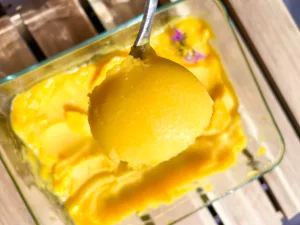Are jelly beans vegan? Jelly beans have been a beloved sweet treat for decades, offering a wide variety of flavors and colors. However, when it comes to determining whether jelly beans are plant-based, it’s essential to examine their ingredients and production methods. Let’s explore the world of jelly beans and shed light on the vegan aspect of these delightful candies.
What are jelly beans?
Jelly beans are small, bean-shaped candies with a chewy texture and a hard candy shell. They come in various flavors, such as fruit, soda, and even novelty flavors like buttered popcorn or cinnamon. Jelly beans are often associated with festive occasions like Easter, where they are commonly used for egg hunts and filling candy baskets.
Understanding Non-Vegan Ingredients in Jelly Beans
While some jelly bean brands offer vegan-friendly options, it’s important to be aware of the ingredients that can make certain jelly beans unsuitable for a vegan diet. Let’s explore some key components that might be present in non-vegan jelly beans:
- Gelatin: Traditional jelly beans often contain gelatin, which is derived from animal collagen. Gelatin provides the chewy texture that jelly beans are known for. However, it is obtained from the bones, skin, and connective tissues of animals, making it unsuitable for vegans.
- Beeswax: In the case of certain jelly bean brands, such as Jelly Belly, beeswax is used as a sealing agent to lock in the flavor and give the beans their shiny appearance. While beeswax is vegetarian-friendly, it is not considered vegan as it is a product of bees.
- Confectioner’s Glaze: Another ingredient to be mindful of is confectioner’s glaze. It is commonly used to coat jelly beans and provide a glossy finish. However, this glaze is derived from the resinous excretions of certain insects, such as lac bugs. Therefore, it is not suitable for a vegan diet.
It’s worth noting that not all jelly beans contain these non-vegan ingredients. Many brands have recognized the demand for vegan options and have made efforts to provide alternatives that exclude animal-derived components. When seeking vegan jelly beans, be sure to carefully read the ingredient list and look for brands that explicitly state their vegan or vegetarian status.
Common ingredients in jelly beans
To understand the vegan status of jelly beans, it’s crucial to familiarize ourselves with their common ingredients. The primary components of jelly beans include sugar, corn syrup, modified corn starch, and artificial flavorings. Additionally, colorings are used to achieve the vibrant hues that make jelly beans so visually appealing.
Gelatin: A key concern for vegans
One of the main ingredients in traditional jelly beans is gelatin. Gelatin is derived from animal collagen and is commonly used as a gelling agent in candies. Unfortunately, gelatin is not vegan-friendly, as it is obtained from the bones, skin, and connective tissues of animals, typically pigs or cows.
Alternatives to gelatin in jelly beans
While gelatin is commonly used in jelly beans, some manufacturers have recognized the demand for vegan-friendly options. As a result, alternative ingredients have been introduced to replace gelatin. These alternatives include plant-based gelling agents like agar-agar, carrageenan, or pectin, which offer similar binding properties without the use of animal-derived substances.
Colorings and flavors in jelly beans
Apart from gelatin, another aspect to consider when determining the vegan status of jelly beans is the source of their colorings and flavors. Some artificial colorings and flavors may contain animal-derived additives. However, many jelly bean manufacturers now use vegan-friendly colorings and flavors, derived from plant-based sources or synthetic compounds.
Sugar coating and wax in jelly beans
In addition to the jelly bean’s core ingredients, the outer sugar coating and the shiny appearance are also worth examining. Some jelly beans are coated with confectioner’s glaze, which is made from the resinous excretions of certain insects. Vegans may prefer to opt for jelly beans without this coating or those coated with plant-based alternatives, like carnauba wax.
Are all jelly beans vegan?
Given the variety of jelly bean brands available in the market, it’s essential to read the ingredient list and labels to determine if they are vegan-friendly. While many manufacturers have shifted towards vegan-friendly formulas, some traditional jelly beans may still contain gelatin and other animal-derived ingredients. Therefore, it’s crucial to look for brands that explicitly state their jelly beans are vegan.
Vegan-friendly jelly bean brands
If you’re searching for vegan jelly beans, there are several brands that offer suitable options. Look for brands that clearly label their products as vegan or vegetarian. Some popular vegan-friendly jelly bean brands include some brands on Amazon. These brands have successfully replaced gelatin with plant-based alternatives and use vegan colorings and flavors.
Tips for finding vegan jelly beans
To ensure you’re selecting vegan jelly beans, here are some helpful tips:
- Read the ingredient list carefully, looking for gelatin alternatives and plant-based colorings and flavors.
- Look for certifications or labels indicating the jelly beans are vegan-friendly.
- Reach out to the manufacturer directly to inquire about their ingredient sourcing and production methods.
Conclusion: Are Jelly Beans Vegan?
Jelly beans are beloved candies known for their chewy texture, vibrant colors, and delightful flavors. While some jelly beans are vegan-friendly, it’s crucial to be aware of ingredients that can make certain varieties unsuitable for a vegan diet.
Gelatin, beeswax, and confectioner’s glaze are common non-vegan ingredients found in some jelly beans. Gelatin is derived from animal collagen, beeswax is a product of bees, and confectioner’s glaze is derived from insect secretions. However, many jelly bean manufacturers now offer vegan alternatives, replacing these ingredients with plant-based substitutes.
When selecting jelly beans, carefully read the labels and ingredient lists to ensure they meet your vegan requirements. Look for brands that clearly state their vegan or vegetarian status. By making informed choices, you can enjoy jelly beans that are both delicious and aligned with your vegan lifestyle.
Check out some of Essy Cook’s delicious vegan desserts and treats here.
FAQ: Are Jelly Beans Vegan?
Yes, several brands offer vegan jelly beans. Look for brands that explicitly state their jelly beans are vegan or vegetarian.
No, not all jelly beans are vegan. Traditional jelly beans often contain gelatin and other animal-derived additives. Always check the ingredient list and look for vegan certifications.
Plant-based alternatives to gelatin in jelly beans include agar-agar, carrageenan, and pectin.
Many jelly bean manufacturers now use vegan-friendly colorings and flavors derived from plant-based sources or synthetic compounds. However, it’s essential to check the labels or contact the manufacturer for confirmation.
To find vegan jelly beans, read the ingredient list, look for vegan certifications, and opt for brands that cater to a vegan audience.




